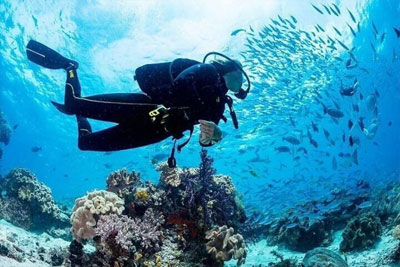What is Scuba Diving?
Scuba diving is an activity of diving beneath the ocean surface using a special breathing apparatus called SCUBA (Self-Contained Underwater Breathing Apparatus). Unlike snorkeling, which is only at the surface, scuba diving allows us to freely explore the depths of the ocean up to tens of meters.
Basic Scuba Diving Equipment
Before diving, divers must use standard equipment, such as:
-
Diving mask – to see clearly underwater.
-
Oxygen tank (scuba tank) – contains compressed air as a breathing source.
-
BCD (Buoyancy Control Device) – to control buoyancy in the water.
-
Regulator – a device that connects your mouth to the oxygen tank.
-
Wetsuit – a protective suit to keep your body warm.
-
Fins – help you swim efficiently.
Who Can Join Scuba Diving?
Scuba diving can be done by anyone who:
-
Is at least 10 years old
-
Is physically healthy
-
Has basic swimming skills
-
Has completed training and holds a license from organizations such as PADI or NAUI
Note: Never dive without proper training. The risks of water pressure, decompression, or disorientation can be very dangerous for beginners.
Benefits of Scuba Diving
-
Exploring Marine Ecosystems
You can see coral reefs, colorful fish, and even shipwrecks (wreck diving) that serve as marine habitats. -
Stress Relief
The quiet underwater world can calm your mind, like meditating in the water. -
A Healthy Sport
Scuba diving involves gentle body movements that are effective for heart and lung health.
Best Scuba Diving Spots in Indonesia
Indonesia is known as a global scuba diving paradise. Some popular spots include:
-
Raja Ampat (West Papua): A coral reef paradise
-
Bunaken (North Sulawesi): A marine park with steep coral walls
-
Wakatobi (Southeast Sulawesi): Extraordinary marine biodiversity
-
Tulamben (Bali): Dive site at the USAT Liberty shipwreck
Safe Scuba Diving Tips
-
Always dive with a certified instructor
-
Never dive alone
-
Check your equipment before diving
-
Follow diving rules, such as not surfacing too quickly
-
Protect marine life—do not touch or damage coral reefs
Conclusion
Scuba diving is not only an extreme sport but also a gateway to understanding the beauty and importance of preserving marine ecosystems. If you’re interested, start with a basic diving course and enjoy an unforgettable experience.

 Bahasa Indonesia
Bahasa Indonesia
